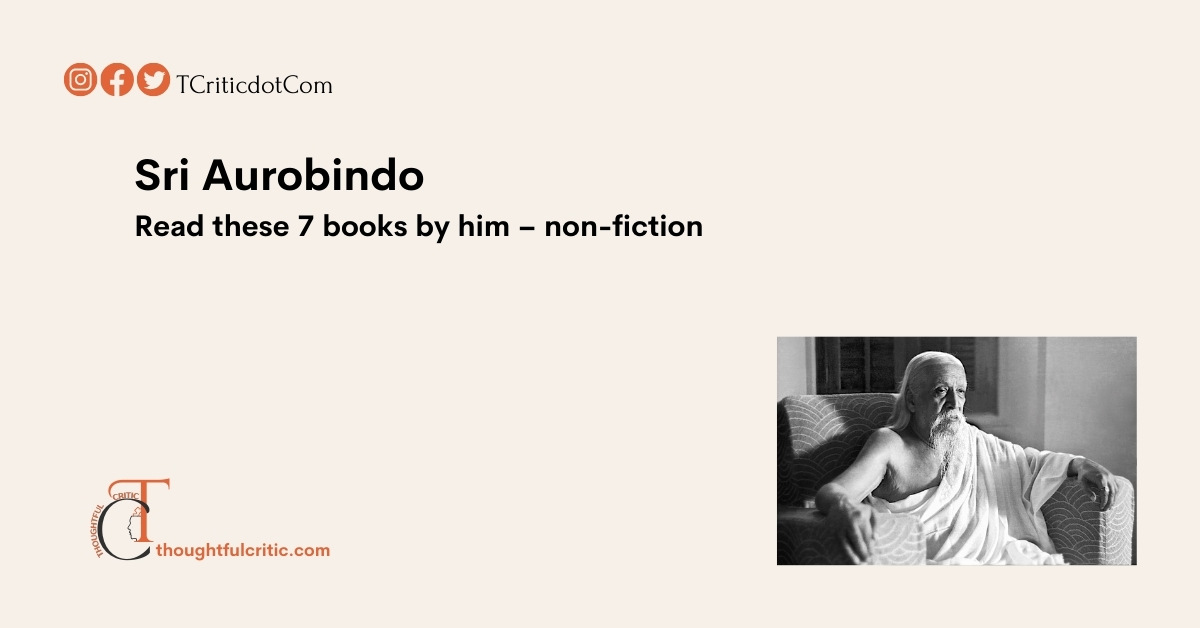Sri Aurobindo was a visionary author whose literary genius bridged the realms of philosophy, spirituality, and poetry. A profound thinker and mystic, he is renowned for synthesising the spiritual and intellectual traditions of the East and the West in his writings. As a spiritual reformer, he sought to reinterpret ancient Hindu scriptures and philosophies for the modern era, making them accessible to a global audience. His works are imbued with deep metaphysical insights, profound reflections on human potential, and an unwavering belief in the evolution of consciousness. From his poetry, such as Savitri: A Legend and a Symbol, to his philosophical treatises like The Life Divine and Essays on the Gita, Aurobindo explored the interplay between the divine and the human, seeking to inspire readers to transcend the material and realise their spiritual potential.
Central to Sri Aurobindo’s writings is his emphasis on humanity’s spiritual evolution. He believed in the transformative power of yoga and spiritual practice to elevate human consciousness to a supramental level beyond the limitations of the mind and ego. His interpretation of the Bhagavad Gita and the Upanishads reflects his mastery of ancient Hindu texts, as he seamlessly wove their teachings into his vision of spiritual progress. His philosophy was not confined to individual enlightenment but extended to collective transformation, emphasising humanity’s role in establishing a divine life on earth. His works offer a nuanced understanding of karma, dharma, and the nature of existence, urging readers to embrace spiritual discipline to realise the divine within.
A defining quality of Sri Aurobindo’s writings is their poetic brilliance and intellectual depth. His command over language, combined with a deep spiritual conviction, rendered his works timeless and transformative. In Savitri, for instance, he masterfully uses symbolic imagery and profound metaphysical themes to convey the soul’s journey. As a spiritual author, he did not merely seek to theorise; his writings guided seekers on the path to self-realisation and divine union. His ability to draw extensively from ancient Hindu scriptures while addressing the spiritual needs of a modern, globalised world underscores his enduring legacy as one of the greatest spiritual authors of modern India. Through his works, Sri Aurobindo continues to inspire countless individuals to seek higher truths and realise their divine purpose.
Below are the books by Sri Aurobindo that everyone interested in philosophy, spirituality and Hindu religious scriptures must read.
1. The Life Divine
This magnum opus is one of Sri Aurobindo’s most profound philosophical works. It explores the nature of existence, the evolution of consciousness, and the ultimate goal of life: the realisation of the divine on earth. Aurobindo delves deeply into the principles of Integral Yoga and the potential for humanity to transcend its limitations to achieve a supramental consciousness. The book synthesises Eastern and Western thought, offering a unique spiritual perspective on science, philosophy, and religion. Its literary significance lies in its comprehensive treatment of metaphysical questions and its bold vision of spiritual transformation, which continues to inspire seekers worldwide.
2. Essays on the Gita
In this reinterpretation of the Bhagavad Gita, Sri Aurobindo unpacks the scripture’s timeless teachings in light of his spiritual philosophy. Rather than treating the Gita solely as a religious text, he presents it as a manual for life, offering profound insights into dharma (duty), karma (action), and spiritual detachment. He illuminates the synthesis of paths—Jnana, Bhakti, and Karma Yoga—within the Gita, making it relevant to modern readers. The literary significance of this work lies in its ability to transcend dogma and provide a practical, spiritual guide for individuals seeking purpose in an ever-changing world.
3. The Synthesis of Yoga
This book is a detailed exposition of Sri Aurobindo’s system of Integral Yoga. It explains how various paths of yoga, including Karma Yoga, Bhakti Yoga, and Jnana Yoga, can be integrated into a holistic approach to spiritual growth. Aurobindo discusses human nature’s physical, vital, mental, and spiritual aspects, providing a roadmap for transcending the ego and achieving unity with the divine. Its significance lies in its practicality and universality, offering a structured spiritual practice that harmonises ancient wisdom with modern sensibilities.
4. The Secret of the Veda
In this insightful work, Aurobindo deciphers the hidden spiritual meanings of the Rig Veda, India’s most ancient scripture. He argues that the Vedic hymns are not merely ritualistic chants but profound expressions of the soul’s spiritual journey. He reveals the allegorical and symbolic dimensions of Vedic deities and rituals through meticulous analysis. The book’s literary significance lies in its groundbreaking reinterpretation of the Vedas, challenging traditional exegeses and presenting them as a rich source of universal spiritual wisdom.
5. The Human Cycle
This book examines the evolutionary progression of human society and the psychological forces that shape it. Sri Aurobindo explores the phases of social development, including the symbolic, typal, individual, and spiritual ages, and predicts the eventual rise of a spiritual age. He connects personal and collective evolution, showing how spiritual progress can influence societal transformation. The book’s literary and philosophical significance lies in its bold synthesis of sociology, psychology, and spirituality, offering a vision of a future where humanity achieves a higher collective consciousness.
6. On the Upanishads
This work is a series of reflections on the ancient Upanishadic texts, which form the core of Indian spiritual thought. Sri Aurobindo delves into their metaphysical and spiritual teachings, revealing their relevance to individual and universal evolution. He highlights concepts such as the Brahman (absolute reality), Atman (self), and the unity of existence. The significance of this book lies in its ability to make these dense and complex texts accessible to modern readers while retaining their profundity and mysticism.
7. The Ideal of Human Unity
Sri Aurobindo examines human unity’s political, social, and spiritual dimensions in this thought-provoking book. Written against global conflicts, the book envisions a future where humanity transcends national and cultural divisions to achieve true unity. He explores political systems’ limitations and emphasises spiritual evolution’s role in fostering global harmony. The literary significance of this work lies in its forward-looking approach, offering timeless insights into the challenges and possibilities of achieving universal brotherhood.
These seven books showcase Sri Aurobindo’s vast intellectual depth and spiritual insight, making them essential reads for anyone interested in philosophy, spirituality, and the evolution of human consciousness. I have deliberately skipped putting Savitri on this list. Savitri is a gem of Indian English poetry. You can enjoy reading that work in two volumes if you enjoy reading Aurobindo’s poetry.
Conclusion
Sri Aurobindo’s corpus of work stands as a towering testament to his sweeping knowledge of Indian philosophy, ancient scriptures, and spiritual wisdom. His writings do not merely revisit the teachings of the Vedas, Upanishads, and Bhagavad Gita; they reinterpret and revitalise them, making them relevant for a modern audience seeking profound answers to life’s deepest questions. By integrating the timeless truths of Indian spirituality with a dynamic vision for human evolution, Aurobindo honours the ancient traditions and provides a roadmap for a spiritually enriched future.
Understanding Sri Aurobindo’s works is akin to embarking on a journey into the very essence of Indian consciousness. His philosophy reveals the intrinsic unity of existence, the potential for divine realisation, and the interconnectedness of individual and collective growth. Through his profound insights, readers can grasp the spiritual essence that defines Indian culture—one that transcends superficial rituals and delves into the pursuit of truth, harmony, and transformation.
For those seeking not just knowledge but a transformative experience, Sri Aurobindo’s writings serve as a beacon. They illuminate the deeper purpose of life, inspire a higher state of consciousness, and instil a sense of global responsibility rooted in spiritual awareness. By immersing oneself in his works, one opens a pathway to understanding not only the true Indian spirit but also the universal truths that bind humanity, leading toward a future of unity, peace, and spiritual fulfilment.
by Deepak for Thoughtful Critic


